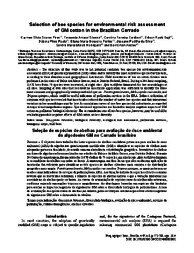Selection of bee species for environmental risk assessment of GM cotton in the brazilian Cerrado.
Selection of bee species for environmental risk assessment of GM cotton in the brazilian Cerrado.
Author(s): PIRES, C. S. S.; SILVEIRA, F. A.; CARDOSO, C. F.; SUJII, E. R.; PAULA, D. P.; FONTES, E. M. G.; SILVA, J. P. da; RODRIGUES, S. M. M.; ANDOW, D. A.
Summary: The objective of this work was to list potential candidate bee species for environmental risk assessment (ERA) of genetically modified (GM) cotton and to identify the most suited bee species for this task, according to their abundance and geographical distribution. Field inventories of bee on cotton flowers were performed in the states of Bahia and Mato Grosso, and in Distrito Federal, Brazil. During a 344 hour sampling, 3,470 bees from 74 species were recovered, at eight sites. Apis mellifera dominated the bee assemblages at all sites. Sampling at two sites that received no insecticide application was sufficient to identify the three most common and geographically widespread wild species: Paratrigona lineata , Melissoptila cnecomola and Trigona spinipes , which could be useful indicators of pollination services in the ERA. Indirect ordination of common wild species revealed that insecticides reduced the number of native bee species and that interannual variation in bee assemblages may be low. Accumulation curves of rare bee species did not saturate, as expected in tropical and megadiverse regions. Species?based approaches are limited to analyze negative impacts of GM cotton on pollinator biological diversity. The accumulation rate of rare bee species, however, may be useful for evaluating possible negative effects of GM cotton on bee diversity.
Publication year: 2014
Types of publication: Journal article
Observation
Some of Embrapa's publications are published as ePub files. To read them, use or download one of the following free software options to your computer or mobile device. Android: Google Play Books; IOS: iBooks; Windows and Linux: Calibre.
Access other publications
Access the Agricultural Research Database (BDPA) to consult Embrapa's full library collection and records.
Visit Embrapa Bookstore to purchase books and other publications sold by Embrapa.

